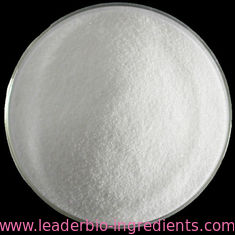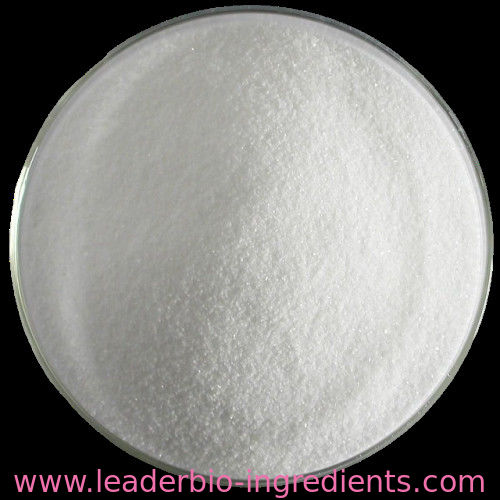
China Northwest Factory Manufacturer Hyaluronic Acid Cas 9004-61-9 For stock delivery
-
Purity99.9%
-
UseHealth Care
-
OriginChina
-
Package1KG/Tin 25KG/Drum*Carton
-
ManufacturerXI'AN LEADER BIOCHEMICAL ENGINEERING CO.,LTD
-
Place of OriginCHINA
-
Brand NameLeader
-
CertificationISO,GMP,SGS,HALA,KOSER,HACCP
-
Model NumberLD
-
Minimum Order Quantity25KGS
-
PriceNegotiate
-
Packaging Details25KG/Drum
-
Delivery Time2-3 working days
-
Payment TermsWestern Union, MoneyGram, T/T, L/C
-
Supply Ability10MTS/Month
China Northwest Factory Manufacturer Hyaluronic Acid Cas 9004-61-9 For stock delivery
| Hyaluronic acid Usage And Synthesis |
| Forms and nomenclature |
dietary supplements; face creams; serums; eye drops; injections |
| Hyaluronic Acid | Hyaluronic acid is a completely transparent, non-adhesive, water-soluble and grease-free acid mucopolysaccharide. Its molecular weight is between a few hundred thousand to millions, and it makes up the dermis layer of the skin. Its unique molecular structure and physicochemical properties has many important physiological functions inside the body, such as lubricating joints, adjusting vascular permeability, adjusting proteins, diffusing and transporting water electrolytes, and promoting wound healing. Hyaluronic acid has a unique water retention effect and has the best known natural moisturizing properties, making it the ideal natural moisturizer. Hyaluronic acid is an essential drug in ophthalmic “sticky surgeries”. It is used in cataract surgery, in which its sodium salt remains in the anterior chamber to maintain depth in the anterior chamber and ensure a clear surgical view. It reduces the occurences of postoperative inflammation and complications, thus improving the vision-correcting effects of the surgery. It is also used in complicated retinol detachment surgery. Hyaluronic acid has a low molecular weight and is considered the ideal natural moisturizing agent, so it is used as an additive in high-end makeup and as a moisturizer in creams, gels, lotions, masks, and serums. It is also used medically as a moisturizer to improve moisture retention and lubrication, and it also expands capillaries and improves skin health. For example, hyaluronic acid with a low molecular weight can be used as a lubricant in surgeries (such as knee surgery), while those with high molecular weight can be used as surgical lubricant and as a substitute for vitreous in ophthalmic surgery. |
| Benefits | Hyaluronic acid’s main functions include:
|
| Side effects |
Studies show that hyaluronic acid with lower molecular weights penetrates deeper into the skin, which can cause inflammation. |
| Uses | Synovitis agent (veterinary). |
| Uses | hyaluronic acid is a glycosaminoglycan component. Hyaluronic acid occurs naturally in the dermis. It is thought to play a critical role in healthy skin by controlling the physical and biochemical characteristics of epidermal cells. It also regulates general skin activity, such as water content, elasticity, and the distribution of nutrients. Its water-absorption abilities and large molecular structure allow the epidermis to achieve greater suppleness, proper plasticity, and turgor. Hyaluronic acid is a natural moisturizer with excellent water-binding capabilities. In a solution of 2 percent hyaluronic acid and 98 percent water, the hyaluronic acid holds the water so tightly that it appears to create a gel. However, it is a true liquid in that it can be diluted and will exhibit a liquid’s normal viscous flow properties. When applied to the skin, hyaluronic acid forms a viscoelastic film in a manner similar to the way it holds water in the intercellular matrix of dermal connective tissues. This performance and behavior suggests that hyaluronic acid makes an ideal moisturizer base, allowing for the delivery of other agents to the skin. Manufacturers claim that the use of hyaluronic acid in cosmetics results in the need for much lower levels of lubricants and emollients in a formulation, thereby providing an essentially greaseless product. Furthermore, its ability to retain water gives immediate smoothness to rough skin surfaces and significantly improves skin appearance. For the benefits of hyaluronic acid to be realized in a cosmetic, the product needs to be applied on a regular basis as it is broken down in skin within 24 to 48 hours of application. note, this is not the case with hyaluronic acid injections as the technology used is different. |
| Definition | hyaluronic acid: A glycosaminoglycan(mucopolysaccharide) that ispart of the matrix of connective tissue.Hyaluronic acid binds cells togrand helps to lubricate joints.It may play a role in the migration ofcells at wounds; this activity ceaseswhen hyaluronidase breaks downhyaluronic acid. |
| Definition | ChEBI: A mucopolysaccharide composed of N-acetylglucosamine and glucuronic acid subunits. It is found in the connective tissues of vertebrates. |
| Brand name | Equron [Veterinary] (Fort Dodge Animal Health); Legend (Bayer Animal Health); Synacid [Veterinary] (Schering-Plough Animal Health). |
| Veterinary Drugs and Treatments | Hyaluronic acid is a natural complex sugar of the glycosaminoglycan family and is a long-chain polymer containing repeating disaccharide units of Na-glucuronate-N-acetylglucosamine. Hyaluronic acid is indicated for use as a surgical aid in cataract extraction (intra-and extracapsular), IOL implantation, corneal transplant, glaucoma filtration and retinal attachment surgery. In surgical procedures in the anterior segment of the eye, instillation of hyaluronic acid serves to maintain a deep anterior chamber within corneal endothelium and other surrounding tissues. Furthermore, its viscoelasticity helps to push back the vitreous face and prevent formation of a postoperative flat chamber. In posterior segment surgery hyaluronic acid serves as a surgical aid to gently separate, maneuver and hold tissues. Hyaluronic acid creates a clear field of vision thereby facilitating intra- and post-operative inspection of the retina and photocoagulation. |
